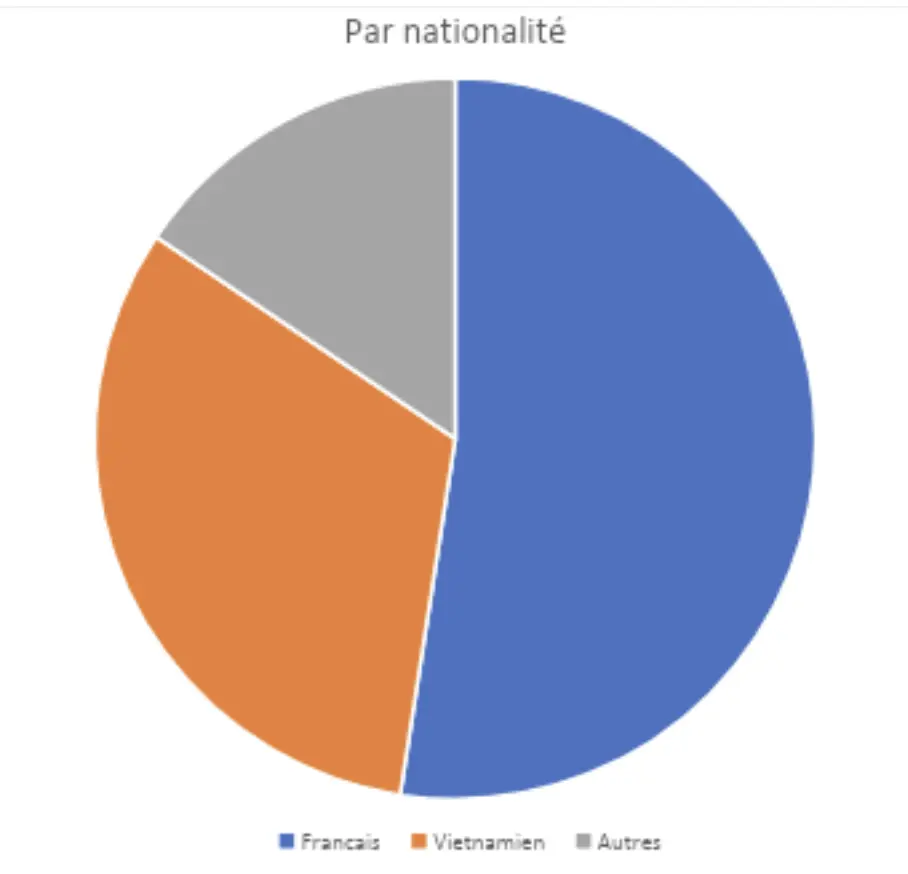After your first visit
Additional information after visiting our schools View Pricing InformationContact us- Welcome Guide for foreign parents
- French Support Classes (FLE/FLSCO)
- Calendar
- Distribution of Children by Nationality 2023-2024
- Communication guide for parents
- Advantages of "AEFE network"
- Opportunities
View the dedicated page with all the information.
Check the page dedicated to French Support Classes (FLE/FLSCO).
Open Calendar in a new tab.
Distribution of Children by Nationality 2023-2024

Total: 225 children across two campuses:
- 147 children at Binh Thanh
- 78 children at Thao Dien
Distribution:
- 118 children of French nationality (52.4%)
- 72 children of Vietnamese nationality (32%)
- 35 children of other nationalities (15.6%)
(Updated: September 2024)
| What – by whom? | How? | When? | IMPORTANCE | To whom? |
|---|---|---|---|---|
| Homework – the teachers | homework notebook | weekly | high | the students |
| Occasional meetings – the teachers | emails | as needed | high | the parents |
| Delays or absence – the parents | Classdojo and/or phone/email secretariat | as needed | high | teachers / Secretariat |
| Elementary school report handover – the teachers | given by appointment via email + K6 Portal | twice a year | high | the parents |
| Handing over of the preschool success notebook – the teachers | given by appointment via email | twice a year | high | the parents |
| School events and parties – secretariat | 1 to 2 weeks before | high | the parents | |
| Information from the management – secretariat | as needed | high | the parents | |
| Emergency for a student – the nurse / teachers | phone | if needed | high | the parents |
| Back-to-school parents meeting – secretariat and PE | once in September | high | the parents | |
| Extracurricular activities – extracurricular coordinator | Portal (registration) + email + ClassDojo (photos) | per trimester + weekly communication | high | the parents |
| School news (Parties/Outings) – communication service | Classdojo/social networks | depending on the events of the week | medium | the parents |
| Class life news – the teachers | Classdojo | In preschool = 1x a week In elementary = As needed |
medium | the students and parents |
| Pedagogical news from the school – pedagogical service | Classdojo | as needed | medium | Parents of both schools |
| Monthly menus – secretariat | Portal | every month | medium | the parents |
Quality and Rigor of Education:
The French curriculum is renowned for its academic rigor and depth in scientific, literary, and humanistic subjects. Students receive a solid education that thoroughly prepares them for higher education.
Multilingualism, Cultural Openness, and International Exposure:
In addition to French, students often learn several foreign languages, which prepares them well for an international environment.
The AEFE network provides significant cultural exposure, with international programs and exchanges that enrich the students’ experience.
Internationally Recognized Diploma:
The French baccalaureate is widely recognized and respected around the world, facilitating admission to international universities and grandes écoles.
Diversity of Educational Options:
The AEFE network offers options such as the International Baccalaureate (OIB), European or Eastern sections, and specific programs tailored to expatriate students.
Access to a Global Network & International Mobility:
The AEFE network includes over 500 institutions in more than 130 countries, offering opportunities for exchange and international mobility for students.
Tuition Fees:
The AEFE network of French schools in Ho Chi Minh City is one of the least expensive compared to other international schools.
What Opportunities After Completing a Curriculum in the AEFE Network
The AEFE network (Agency for French Education Abroad) offers excellent preparation for higher education, a solid springboard for higher education, and professional integration in France, Europe, and worldwide.
In France
- Grandes Écoles:
- Students from the AEFE network can access preparatory classes for the grandes écoles, which later allow entry to prestigious institutions such as HEC, ESSEC, Sciences Po, Polytechnique, etc.
- Universities:
- Students can enroll in French universities to pursue undergraduate, master’s, and doctoral degrees in various fields.
- Parcoursup is the main platform for applying to undergraduate programs in France.
- Specialized Institutes:
- Specialized schools in art, design, architecture, or healthcare professions are also accessible.
In Europe
- Erasmus+ Program:
- Students can benefit from this program for university exchanges in other European countries.
- European Universities:
- French high school diplomas are well recognized in Europe, facilitating admission to European universities.
Internationally
- United States and Canada:
- Students from the AEFE network can apply to American and Canadian universities.
- United Kingdom:
- British universities accept French high school graduates.
- Other regions of the world:
- Students can also apply to universities in Asia, Australia, Latin America, etc., where French diplomas are often recognized.
The Cost of Higher Education
In Europe, it is generally much cheaper than in other countries, especially the United States, Canada, or Australia.
In many European countries, higher education is largely subsidized by the state, keeping tuition fees low or even free for European students.
Education is often considered a public service in Europe, which implies democratic access to higher education for all, regardless of financial resources.
Some European countries have implemented social policies to facilitate access to higher education, such as scholarships, housing assistance, and transportation discounts.
In summary, the advantages of an AEFE program are:
- Excellent preparation for higher education and international recognition of the French baccalaureate.
- Privileged access to French grandes écoles and European universities.
- Possibility to benefit from international exchange programs like Erasmus+.
- Global career prospects.
- Access to high-quality higher education at a low cost in Europe.
The AEFE network thus provides a true springboard for your child’s success, allowing them to thrive in their studies and future professional life.




